
Dubai to boost green mobility with 170% increase in public charging stations planned by 2025
Dubai has consistently been rated as one of the ‘world’s best cities to drive’ with exceptional ratings in measures like traffic congestion and road and public transport quality. Now, the city is set to add a compelling eco-friendly dimension to its world-leading driving experience with an ambitious plan to expand its electric vehicle (EV) charging infrastructure.
Dubai Electricity and Water Authority (DEWA), which is steering the emirate’s clean energy transition, aims to grow the city’s network of public charging stations by 170 percent in less than three years. By 2025, EV Green Charging Stations in Dubai will increase from the current 370, with more than 680 charging points, to 1,000 Green Charging Stations.
Dubai’s electric mobility plans represent a key pillar of the strategy to implement the vision of His Highness Sheikh Mohammed bin Rashid Al Maktoum, Vice President, Prime Minister and Ruler of Dubai, to transform Dubai into a global green-economy hub. The emirate’s Clean Energy Strategy 2050 and Net Zero Carbon Emissions Strategy 2050 seek to generate 100 percent of its power from clean energy sources by 2050. Furthermore, Dubai's Roads and Transport Authority (RTA) has rolled out a long-term strategy to migrate towards net-zero emission public transport by 2050.
Dubai’s move to green mobility received a strong boost in 2015 when DEWA launched its EV Green Charger Initiative as part of its Green Mobility Strategy 2030. The number of EV owners registered under the initiative has increased from a mere 14 in 2015 to more than 11,000 by the end of May 2023. The figure is expected to double in the near future. By 2030, Dubai aims to have over 42,000 electric cars on its roads.
Saeed Mohammed Al Tayer, Managing Director and CEO of DEWA, said, “Consistent with HH Sheikh Mohammed bin Rashid Al Maktoum’s overarching vision for sustainable development, Dubai recognises that green mobility is the future of transportation. Together with other Dubai entities and key stakeholders, DEWA has drawn out a strategic blueprint that reimagines the future of urban transportation in the emirate. As part of this broader framework, DEWA is working to create an accessible world-class infrastructure to advance the adoption of eco-friendly transportation. By encouraging electric vehicle usage, DEWA’s EV Green Charger Initiative contributes not only to carbon emissions reduction but also fosters sustainable practices throughout Dubai.”
The burgeoning sales of electric vehicles also support Dubai’s green mobility vision. Demand for EVs in the UAE is projected to grow at a compound annual rate of 30 percent between 2022 and 2028, according to the Global Electric Mobility Readiness Index published last year. The report Index ranked the country eighth globally in terms of electric mobility readiness. Meanwhile, worldwide sales of electric cars are expected to surge by 35 percent in 2023 to reach 14 million and the share of the overall car market is set to increase to 18 percent this year, according to the International Energy Agency (IEA).
To cater to the growing demand for EV charging infrastructure, DEWA has currently deployed over 370 charging stations across Dubai. The stations offer a range of charging options, including ultra-fast chargers, fast chargers, direct current chargers, public parking chargers and wall chargers. The stations are available round the clock at key locations such as fuel stations and public parks in addition to those located at DEWA's customer happiness centres and shopping centres, which operate during their respective opening hours.
DEWA's EV Green Chargers have provided 13,264 MWh of electricity from 2015 to the end of 2022, powering a cumulative electric vehicle distance of over 66.3 million kilometres. By the end of 2022, the stations recorded over 720,000 charging sessions conducted by 9,653 registered electric vehicles.
DEWA’s efforts to boost the emirate’s public charging infrastructure have also resulted in the reduction of 236,700 tonnes of carbon emissions as of April 2023, a testament to the growing success of its clean energy strategy.
source : wam



























